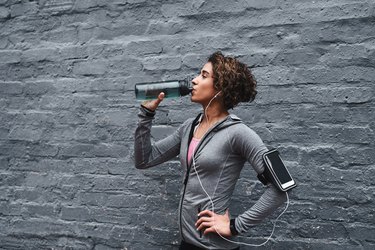
Get your eight glass of water a day — maybe a few more sips if you work out — and you're good, right? Not so fast. Staying hydrated isn't that simple, but it also doesn't have to be complicated. Here are eight hydration mistakes you might be making, with easy fixes to remedy them ASAP.
1. Not Drinking Enough Water
Video of the Day
So how much do water do you need in a day? There is not one single specific requirement. The National Academies of Sciences reports that most people meet their needs by allowing thirst to be their guide.
Video of the Day
That said, there are some general guidelines for total water intake from food and drinks. Men should aim for about 3.7 liters (about 15.5 cups or 125 ounces) per day and women 2.7 liters (about 11.5 cups or 91 ounces) per day. Granted, every single person is different. For example, if you're active or spend a lot of time outside in the heat, you'll need more water than if you're sitting inside all day.
Read more: Which is Better, Drinking Ice Water or Warm Water?
2. Drinking Water on an Empty Stomach
If it's hydration you're after, drinking plain water on an empty stomach might not be the best strategy. According to a December 2015 study published in the American Journal of Clinical Nutrition, drinking plain water on its own isn't the most effective way to hydrate. When compared to other beverages like orange juice and milk, our bodies aren't able to retain plain water as well. Why? Macronutrients and electrolytes play a role in helping our body absorb and retain any of the water we take in. If you're trying to stay hydrated, drink your water with a meal or snack so that there are other nutrients present to help you retain more of the water.
3. Assuming Coffee and Tea Don’t Count
Coffee and tea contain caffeine (for the most part), but they're not as dehydrating as we once believed. It turns out that both of these beloved beverages can be hydrating, since we hold on to more of the water than we lose. A January 2014 PLOS One study found that there was no real difference in hydration status in men when drinking about 3.5 cups of coffee per day compared to drinking just water (no coffee).
4. Skimping on Water During Your Workout
When we work out, our bodies lose water through sweat (and some through just breathing). How much we sweat can vary from person to person. Regardless, you want to keep your body from losing too much water through exercise by staying hydrated while you're actually working out, in addition to drinking fluids before and after. The golden rule for workout hydration? Drink seven to 10 ounces every 10 to 20 minutes, according to the American Council on Exercise.
5. Believing Hydration Is Only About Water
Yes, H2O is half the battle against dehydration. But electrolytes, carbohydrates and other minerals are also important when it comes to retaining fluids. Minerals like potassium, sodium and chloride help get water to your cells. If you're running too low on something like salt, you can actually become dehydrated, hence why most sports drinks contain these electrolytes.
Carbohydrates and sugar are also important to combine with water when you're working out for an extended period of time, since they help hold onto fluids and fuel your workout. If you're exercising for more than an hour, you may need to start supplementing with some carbs, according to the Mayo Clinic.
6. Forgetting to Pair an Alcoholic Drink With a Glass of H2O
Don't pull this rookie mistake. Alcohol is a diuretic, so if you are going out for the night and plan on having a few drinks, it makes sense to pair your adult beverage with a glass of water to prevent dehydration — and a hangover. Looking for other tips to prevent morning-after symptoms? Don't drink on an empty stomach and stick to clear alcohols.
Read More: Can You Prevent a Hangover With Vitamin B Complex?
7. Mistaking Hunger for Thirst
Eating when you're actually thirsty is quite common. Think about the symptoms of both hunger and thirst — fatigue, headache, irritability, lightheadedness and difficulty concentrating. Seems fairly simple to get those wires crossed. On top of that, because most of us eat and drink frequently throughout the day, hunger and thirst cues can be harder to decipher.
8. Forgetting About Water-Rich Foods
You might get so focused on counting your daily ounces of water that you forget about the foods you're eating. Good news: They actually count toward your total fluid intake, too. In fact, water-rich fruits and vegetables like tomatoes, watermelon and cucumbers are a win-win, since they're filled with water and the hydration-friendly mineral potassium.
- The National Academies of Sciences: "Dietary Reference Intakes: Water, Potassium, Sodium, Chloride, and Sulfate"
- The American Journal of Clinical Nutrition: "A Randomized Trial to Assess the Potential of Different Beverages to Affect Hydration Status: Development of a Beverage Hydration Index"
- PLOS One: "No Evidence of Dehydration with Moderate Daily Coffee Intake: A Counterbalanced Cross-Over Study in a Free-Living Population"
- American Council on Exercise: "How Hydration Affects Performance"
- Mayo Clinic: "Nutrition Rules That Will Fuel Your Workout"
- Mintel: "A Snacking Nation: 94% of Americans Snack Daily"
Is this an emergency? If you are experiencing serious medical symptoms, please see the National Library of Medicine’s list of signs you need emergency medical attention or call 911.